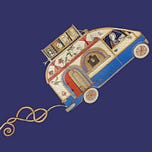The Chest of “Nazi” Papers
Roger McAllister always radiated to his clients an air of confidence—the ethos of a man two or three steps ahead of whatever situation might arise. It was part of his professional commitment, a form of service to his clients, so that they could trust him implicitly as their guide through any sticky dilemma, as when a jealous rival, say, might dare to impugn the provenance of a certain quarto, or when the promised delivery date for an editio princeps might come and go, receding, unfulfilled, into the past. On his book tour, McAllister regarded it as a matter of common courtesy to present the same self-assured manner to his book-buying public, to anyone out there who might possibly buy a copy of The Song of Henry. And so, in his interviews and public appearances, he omitted any reference to how inept and dim-witted he had felt, four years earlier, during that moment in the attic—the moment when he belatedly realized that the three women he was speaking to were the principal heirs of a very large fortune. Nonetheless, he found this to be the perfect point in his narrative to remind his audience about the sale of JKJ Graphics, a revelation he would make with a flourish—a billion-dollar price tag!—as if he had simply been withholding the fact until he had set the stage properly, until he had painted, with his words, the tableau of himself, the three sisters, and the books and papers of their grandfather. The trick usually worked; sometimes, at the mention of so much money, McAllister could hear his audience gasp.
After the big reveal, McAllister would usually take a moment to step outside the scene in the attic and share with his interviewer or his audience some of what he would soon learn regarding the artifacts about to be placed under his stewardship.
“My investigations would be thorough and scholarly. Unrelenting, you might say. But also very discreet. I was exquisitely aware that these boxes—the large chest in particular—had developed a whispered reputation, among the younger generations of the Josephson family, as ‘Grandpa Joseph’s Nazi papers.’
“Nazi... ” McAllister would repeat the word in a solemn stage whisper, shaking his head.
“Certainly, Konrad Joseph had friends... he had correspondents, colleagues, comrades who later did in fact become… ”
Here McAllister would trail off in sadness and dismay. After a moment, he would recover, and with new energy proclaim to all listeners that Joseph Konrad Josephson had never and could never have been himself a Nazi—and not simply because he was a Jew, McAllister would say, his voice rising, but because “he was an idealist, like Wagner, and idealism, however deluded, should never be a source of shame.”
Often at this point his interviewer would lean back thoughtfully, allowing the moment of passion to dissipate.
After a brief pause, McAllister would return to the scene in the attic.
Before they allowed him to touch a thing, the granddaughters of Konrad Joseph insisted on three conditions: first, as previously stated, that he should extract and preserve any evidence he might find of their relatives in Germany, their aunts, uncles and cousins, however distant; second, that everything else, including the professional and political correspondence of their grandfather, must be destroyed; and third—
McAllister stopped the sisters right there:
“You do not hire someone like me to be a garbage man,” he told them. “You know that I will read and study everything in that chest. I will take detailed notes.”
The eldest daughter thought for a long moment.
Her younger sisters looked at her expectantly.
At last she said “Yes. We understand.”
Her sisters nodded in agreement.
“You may keep your little notes,” the youngest sister said.
“As long as those notes are in English,” said the second sister, the one who seemed to be a lawyer. “Not a word in German. Or Yiddish.”
“Or even Hebrew, if there is any,” added the youngest sister, the attractive one.
“We don’t want a single word of the original correspondence to survive,” said the second sister.
“Not a trace,” said the youngest sister.
McAllister reluctantly agreed, and asked about the third condition.
The sisters looked at each other. Finally the second sister spoke.
“If you discover anything that shows our grandfather to be a Nazi collaborator, not only will you destroy it, you will never disclose its existence to a living soul,” she said.
“Not even us,” said the eldest sister.
“Especially not us,” said the youngest.
Next episode: Eavesdropping
(available when published)
For the impatient:
Buy ebook, audiobook on Amazon
Buy paperback on Lulu
Or just wait for the next episode…












Share this post